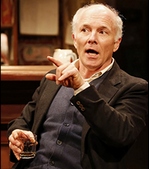SITE GUIDE
SEARCH
REVIEWS
REVIEW ARCHIVES
ADVERTISING AT CURTAINUP
FEATURES
NEWS
Etcetera and
Short Term Listings
LISTINGS
Broadway
Off-Broadway
NYC Restaurants
BOOKS and CDs
OTHER PLACES
Berkshires
London
California
New Jersey
DC
Philadelphia
Elsewhere
QUOTES
TKTS
PLAYWRIGHTS' ALBUMS
LETTERS TO EDITOR
FILM
LINKS
MISCELLANEOUS
Free Updates
Masthead
A CurtainUp Review
The Weir
| "I wonder if being out here in the country is the best place for you. Hiding yourself away. Listening to old headers like us talking about the fairies. Having all your worst fears confirmed for you."—Jack
|

Dan Butler (Photo: Carol Rosegg)
|
Following its acclaimed London run The Weir opened on Broadway in 1999 to good reviews and a respectable run. Despite the slightly corny B-movie contrivance of the set-up, we willingly listen to the ghost stories as told by five convivial occupants. They are the fabric of the play. You can also depend upon an ample supply of Guinness, stout, shots of whiskey, even a glass of white wine (the latter becomes a point of humor) to charge the chatter of four local men and a female newcomer from Dublin.
The evening progresses slowly but with an element of suspenseful apprehension as the men take turns revealing macabre lore about the resident ghosts to the woman who will undoubtedly have her own I-can-top-that-story. The groundwork has been set and the grumbling begins as Jack (Dan Butler), a pub regular, arrives to find the tap out-of-order and that he has to settle for Guinness in the bottle. Jack is even less pleased by the arrival of Finbar (Sean Gormley), a forty-something part-time but successful realtor, mildly resented by all. Finbar has been spending the last few days giving Valerie (Tessa Klein), the "blow-in" tenant from Dublin, a sightseeing tour of the countryside.
It only takes the presence of a stranger to perk up the usual gossipy banter between Brendan (Billy Carter), the bar's thirty-something, lonely proprietor, Jack, the local garage owner, and Jim (John Keating), his forty-something assistant. They are all only too eager to impress the quiet but friendly newcomer with their personal encounters and knowledge of ghostly comings and goings that include a graveyard spirit, a message from a Ouija board and the presence of a fairy road.
McPherson's award-winning play recently been revived to acclaim in London (Curtainup's review ). In New York, the atmospherically realized Irish Rep. production, validates the play's worthiness among the more engrossing plays dealing with the supernatural. Following a trail of monologues in this genre may not be everyone's cup of tea, and as ghost stories go, they are all rather tame and un-terrifying. But that is also part of their appeal, particularly the woman's final sad story evoking a personal tragedy.
McPherson's often charmingly contentious characters have been afforded splendidly realized performances, particularly since these characters, although glib and prone to four-letter expletives, are decidedly less eccentric and blustery than is the custom for Irish pub habitués.
Even as one's ears attend the tales, they can pick up the resentful attitudes, half-hearted scorning, and the playful empathetic baiting that pass between the men and enhance their gift for story-telling. It's impossible not to think that the pugnacious spirit of James Cagney hasn't entered Butler as the flinty, fast-talking Jack, the fifty-something bachelor owner of a local garage and the first to get the evening crackling with his yarn about the fairy road.
Carter is quite good as the close-to-melancholy Brenden whose country-side pub gets a seasonal boost from "the Germans." Keating, who is making his 12th appearance with the Irish Rep., is standout, this time as Jim, Jack's less talkative assistant at the garage, but the one whose chilling tale about a ghost in a graveyard gets everyone riled up. Gormely is amusingly assertive as the self-satisfied and married Finbar who appears just a little over-attentive to the attractive Valerie. Klein gives a lovely performance as the thirty-something Valerie whose own extraordinary experience brings the play to its poignant conclusion.
There is no doubt about McPherson's gift for Irish-ized story-telling, as exemplified in his subsequent plays, Shining City (2006) and The Seafarer (2007), both of which received Tony nominations. You can also be assured that the Irish Repertory Theatre ensemble has brought out the best in these stories.
|
The Weir By Conor McPherson Directed by Ciarán O'Reilly Cast: Dan Butler (Jack), Billy Carter (Brenden), John Keating (Jim), Sean Gormley (Finbar), Tessa Klein (Valerie) Set Design: Charlie Corcoran Costume Design: Leon Dobkowski Lighting Design: Michael Gottlieb Sound Design: Drew Levy Running Time: 1 hour 40 minutes no intermission The Irish Repertory Theatre, 132 West 22nd Street (212) 727 - 2737 Tickets: $55 - $65 Performances: Wednesday 3pm and 8pm; Thursday at 7pm; Fridays at 8pm; Saturdays at 3pm and 8 pm; Sundays at 3pm (with the following exceptions: additional performance Tuesday, July 2 at 7 pm; no performance Thursday, July 4 at 7pm). From 05/15/13 Opened 05/23/13 Ends 07/07/13 Review by Simon Saltzman based on performance 05/18/13 |
| REVIEW FEEDBACK Highlight one of the responses below and click "copy" or"CTRL+C"
Paste the highlighted text into the subject line (CTRL+ V): Feel free to add detailed comments in the body of the email. . .also the names and emails of any friends to whom you'd like us to forward a copy of this review. Visit Curtainup's Blog Annex For a feed to reviews and features as they are posted add http://curtainupnewlinks.blogspot.com to your reader Curtainup at Facebook . . . Curtainup at Twitter Subscribe to our FREE email updates: E-mail: esommer@curtainup.comesommer@curtainup.com put SUBSCRIBE CURTAINUP EMAIL UPDATE in the subject line and your full name and email address in the body of the message. If you can spare a minute, tell us how you came to CurtainUp and from what part of the country. |



 Anything Goes Cast Recording
Anything Goes Cast Recording Book of Mormon -CD
Book of Mormon -CD